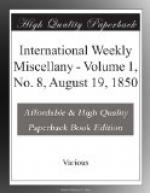The origin of the Russian theater is altogether more recent. It is true that Peter the Great meddled a good deal with the theater as well as with other things, but it was not till the Empress Catharine that dramatic literature was really emancipated by the court. Under Alexander and Nicholas the most magnificent arrangements have been made in every one of the cities that from time to time is honored by the residence of the Emperor, so that Russia boasts of possessing five theaters, two of which excel everything in Europe in respect to size and splendor, but yet possesses no sort of taste for dramatic art. The stage, in the empire of the Muscovites, is like a rose-bush grafted on a wild forest tree. It has not grown up naturally from a poetic want in the people, and finds in the country little or nothing in the way of a poetic basis. Accordingly, the theater in Russia is in every respect a foreign institution. Not national in its origin, it has not struck its roots into the heart of the people. Only here and there a feeble germ of theatrical literature has made its way through the obstinate barbarism of the Russian nature. The mass have no feeling for dramatic poetry, while the cultivated classes exhibit a most striking want of taste.
But in Russia everything is inverted. What in other nations is the final result of a long life, is there the beginning. A natural development of the people appears to its rulers too circuitous, and in fact would in many things require centuries of preparation. Accordingly, they seek to raise their subjects to the level of other races by forcing them outwardly to imitate their usages. Peter the Great says in his testament: “Let there be no intermission in teaching the Russian people European forms and customs.” The theater in Russia is one of these forms, and from this it is easy to understand the condition it is in.
It is true there are in the country a few independent companies of players, but they are not Russian, or at least were formed as a speculation by some foreigner. For example, Odessa has often two such, and sometimes three. The Italian company is said to be good. The Russian, which has now become permanent, has hitherto been under the management of a German, and has been very poor. The company in Kiew consists mostly of Poles, from the old Polish provinces incorporated with Russia, and has a high reputation. In Poland it would be possible in every little nest of a city to get together a tolerable company for dramatic performance. In Russia it would be much easier to raise an army. The ultimate reason of this striking contrast is the immense dissimilarity in the character of the two nations. The Pole is remarkably sanguine, fiery, enthusiastic, full of ideality and inspiration; the Russian is through and through material, a lover of coarse physical pleasures, full of ability to fight and cut capers, but not endowed with a capacity quickly to receive impressions and mentally elaborate them.




